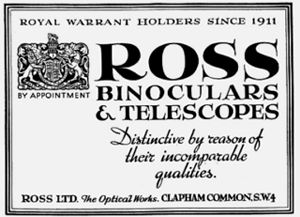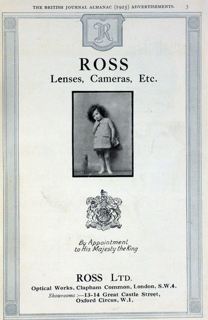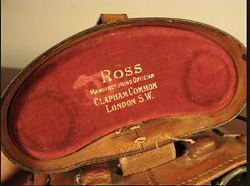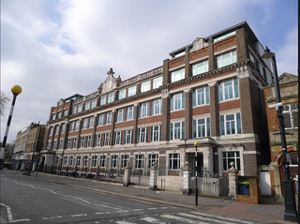The Clapham Society Local History Series — 25
From Ross to Experian – lenses to computers
by Alyson Wilson
This article first appeared in the South London Press on 20 June 2017
(Entitled: ‘Clapham under the microscope’)

In 1829 Mr Andrew Ross (1798-1859) founded Ross & Co, Manufacturing Opticians, the first company to manufacture photographic lenses in England. In 1851 a Bond Street shop was opened as an outlet originally for the lenses, but soon also for the cameras, binoculars and microscopes produced at the Clerkenwell works. The company had an early association with Zeiss lenses, and in WW1 took over their UK factory
As the business grew new premises were needed, and in 1891 the company bought a semi-detached villa in Clapham, No 3 Clapham Common North Side, and very soon afterwards added No. 2. These houses were adapted and extended, and specialised workshops built in the grounds behind. John Stuart, an accomplished photographer who joined the company in the 1870s, later to become managing director, was responsible for the development of several new types of photographic and microscope lenses including a variable power gun sighting telescope which was the forerunner of many types of naval gun sighting instruments and periscopes. This became the standard type used by the British, Italian, Japanese, and many other foreign navies. On the outbreak of WW1, the entire output of Ross Ltd was requisitioned by the government, which meant that all general trade was stopped; special machinery was installed, old buildings were extended, and a new building erected. Because of the importance of the company to the war effort, in 1915/16 Ross were allowed to demolish the former houses (2 and 3 North Side) and construct a totally new building, designed by an architect with local connections, Searle & Searle. This is the building which survives today.

The Ross factory became one of Clapham’s leading employers, with around 1200 employees at one time. There was an interesting article about the factory in a local newspaper in 1962, by which time, the payroll had reduced to around 400, and the company had stopped making cameras to concentrate on lenses, binoculars, telescopes and scientific instruments. There were still many employees, mostly local men, who had spent their entire working lives at Ross, and whose technical expertise was unrivalled. The Managing Director at the time stated: ‘We are the premier optical company in the United Kingdom at the moment but we want to be once again the premier company in the world. ‘
But it was not to be. The company merged with Barnett Ensign, to become Ross Ensign for a time, but it was finally sold and manufacturing in Clapham finished in 1975.
The buildings were then taken over by Lambeth Council and run as a youth training centre, which was named George West House, to commemorate a former local councillor.

In 1990 Tony Bickley, a local computer programmer, wrote the initial code for address management software at his Clapham home, and soon founded his company QAS, (Quick Address Systems). We are now used to giving our postcode and knowing that our full address can be found, and it can be linked to additional information, such as electoral registers and business information. But in 1990 this was revolutionary. The company expanded rapidly, first at a base in Balham and then in Clapham Old Town, before buying the neglected George West House in the early 1990s. The architectural practice, Allies and Morrison, was commissioned to completely refurbish the property. In an 18-month programme internal walls were removed to provide several floors of airy open plan office, and roof glass pavilions added which gave stunning views over London.

Clapham Common North Side
QAS celebrated their move to George West House in January 1994 with a grand opening party to which they invited local businesses, former employees of Ross, and Derek West, the son of George West after whom the building was named. Clapham was delighted to welcome a company providing many jobs, which reversed the trend of loss of local employment. In addition QAS was a generous employer with a community spirit which recalled the earlier Ross firm.
The social committee provided outings, subsidised cinema visits, football, softball and volleyball on the Common and free lunch every Friday at the local Pepper Tree restaurant!
The company also engaged with the local community, planting daffodils on the Common, providing books for the library and supporting nearby Trinity Hospice and other local charities.
By 2004 QAS had offices around the world, and had made a profit of £6m in the past year. Times were changing and what had been for 14 years a family company was sold to become part of a large organisation, the Experian Group. The company continues to operate in Clapham and provide local jobs, but now there are plans to leave and the building will be sold. A planning application for change of use to residential has just been refused, and while it is hoped that the building might become home to another significant local employer, the prospects are not encouraging.